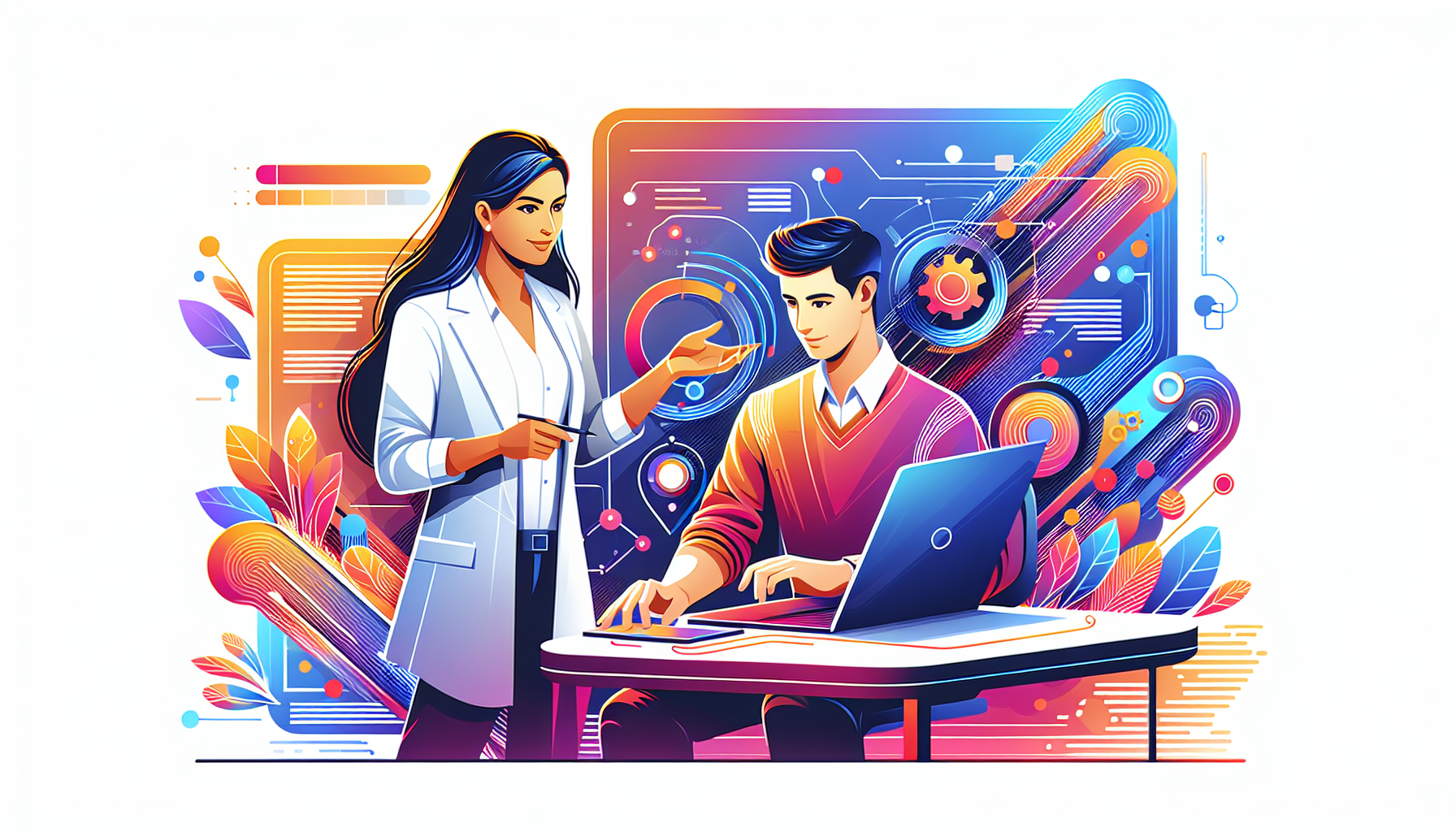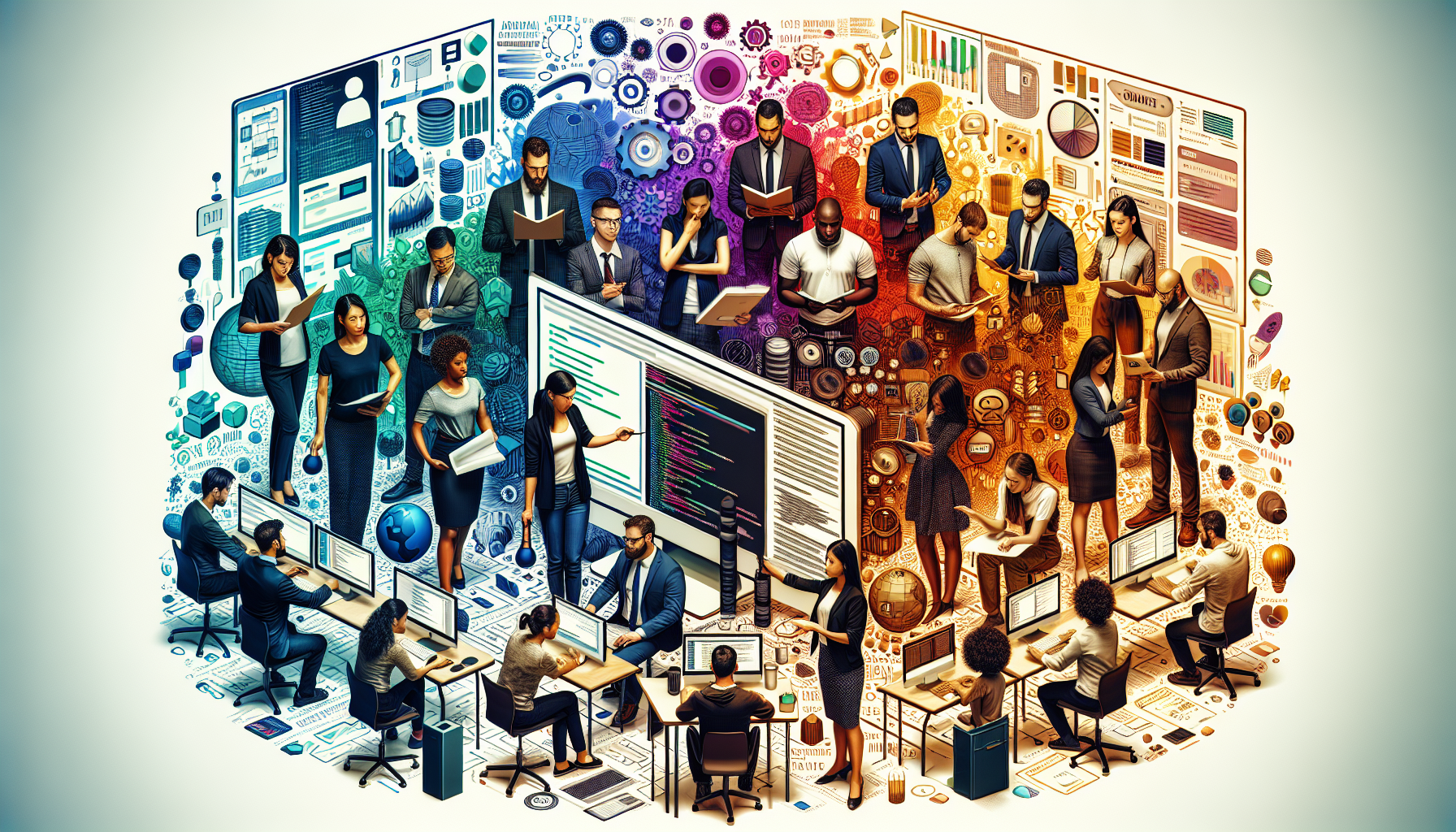On this page
The first Front End Happy Hour podcast of 2024 features guest Marc Grabanski, CEO of Frontend Masters, discussing the evolution of online learning. The conversation covers Marc's journey, the impact of video in online learning, the rise of 'edutainment' and tech influencers, the role of mentors, and the benefits of learning from various perspectives. The discussion also delves into the value of following successful figures in technical fields, the importance of resonating with certain personalities, the danger of hero worship, and the recognition of different learning styles.
How does it apply to you?
This podcast can guide learners on how to navigate their learning journey online, understand the value of mentors, and avoid pitfalls like hero worship. It can also help educators understand the needs of today's learners and how to adapt their teaching methods accordingly.
Developer Checklist
Learning and Teaching
Mentorship
Online Etiquette and Usage
Career Development
Future of Learning
Lifestyle and Well-being
Summary
Introduction to the Episode
The episode starts with an introduction to the first podcast of 2024. The host expresses excitement about the episode and introduces the guest, Marc Grabanski, from Frontend Masters. They discuss their admiration for Frontend Masters as a platform for learning about coding and software engineering. The host mentions that some of them have had the experience of being teachers on the platform.
Marc's Introduction
Marc Grabanski, CEO of Frontend Masters, shares a brief introduction of his journey. He describes himself as a kid from a small town in Minnesota who learned various skills from online communities. He emphasizes the importance of online communities in his career development, from learning web development and web design to building computers. He mentions how he carries forward these experiences through Frontend Masters.
Evolution of Online Learning
Marc talks about how online learning has evolved over the years. He explains how his ability to disseminate information and teach others has propelled his career forward. He mentions how the platforms for sharing knowledge have changed over time, from blogging platforms to social media. He talks about the rise of edutainment on platforms like YouTube and Twitch, where people can learn while being entertained. He also emphasizes the importance of deep, focused learning on platforms like Frontend Masters.
Value of Video in Online Learning
The speakers highlight the impact of video in online learning, emphasizing its advantages over other media like podcasts. They note that video offers a visual representation of the learning process, providing a step-by-step guide on how to do something. For instance, in learning Photoshop, one can see exactly what to click on and follow along. This visual aspect is missing when one is only listening to a podcast or reading a text, which may not offer the same depth of understanding.
Edutainment and Tech Influencers
The conversation moves to the concept of 'edutainment', a blend of education and entertainment, and the role of tech influencers in the learning process. Some influencers are highly skilled and watching them live code can be an enriching experience. However, others are more focused on entertainment, views, and clicks, and their advice may not always be reliable or educational. The speakers stress the importance of critical thinking and understanding that the answer to a technical problem often depends on the specific context.
The Role of Mentors in Learning
Mentors play a crucial role in the learning journey, providing guidance and a path to follow. Early in one's career, having a mentor can be especially beneficial. However, as one matures and gains experience, their needs change and they may outgrow their initial mentors. The speakers emphasize that it's important to learn how to do things in a way that works best for an individual, and to understand that mentors can change over time.
Learning from Different Perspectives
The speakers discuss the benefits of learning from various mentors or teachers, each with their unique approach and perspective. They mention Frontend Masters, a platform where learners can see how different professionals in the field do things. This provides a diverse range of examples and allows learners to see different ways of approaching a problem or task.
Insights from Following Successful Figures
The discussion highlights the value of having a blueprint or a successful figure to look up to and learn from, especially in technical fields like JavaScript or TypeScript. It's noted that this person could provide valuable insights and perspectives, even if you don't necessarily agree with all of their views. The process of learning from different people over time, and how those influences change as one progresses in their career or technical proficiency, is also discussed.
Resonating with Personalities
The conversation moves to the topic of resonating with certain personalities. It's pointed out that in today's interconnected world, one might find a person whose ideas or ways of thinking they resonate with and follow them, learning from their perspectives. This, it's argued, could be beneficial as it offers a variety of perspectives to learn from, even if one can't find a dedicated mentor in their immediate surroundings.
The Danger of Hero Worship
A potential downside to following influential figures is discussed: the risk of hero worship. This is when someone in an impressionable stage takes someone else's opinions as complete truth, arguing not from their own perspective but from what they think their idol believes. This blind following of tech influencers is identified as a potentially negative aspect of this learning style.
Different Learning Styles
The conversation acknowledges that different people have different learning styles, and that this is something to embrace rather than resist. The value of balance and not reacting quickly to new information is also discussed.
The Problem with Edutainment and Online Learning
A criticism of the edutainment and online learning space is raised, particularly when influential figures use their platform to unfairly criticize certain technologies or individuals. It's argued that this approach is not conducive to being a good software engineer. Instead, understanding and respect for the time and effort put into developing solutions, even if they don't align with one's personal preferences, is advocated. The need to move past tribalism and to make informed decisions about technology choices is also stressed.
Balanced Opinions and Social Media
The speaker discusses the difficulty of maintaining balance in opinions, particularly in the context of social media, where content that evokes strong emotions tends to gain more engagement. They note that this phenomenon can lead to people having strong feelings about things without a clear reason. The speaker suggests that this is not just a developer issue, but a global social media issue, where the goal is to get as much engagement and interaction as possible.
Online and Offline Personas
The speaker discusses the difference between online and offline personas, noting that people may present a more balanced and nuanced view in person than they do online. This can also apply in a professional context, where a person's online preferences may not reflect their actual work behavior. For example, a developer might express a preference for a new technology online, but still work effectively with older technologies in their day-to-day work.
Online vs Real World
The speaker emphasizes that social media is not reality, and that the way people interact online can be very different from how they interact in person. They also discuss how the drive for engagement and interaction can lead to a disconnect between a person's online and offline personas.
Learning Through Short Form Video
The speaker discusses the trend of learning through short form videos, such as those on TikTok. They express concern that these videos might give the impression that software engineering is easy to learn, which could lead to frustration when learners realize that the reality is more complex. The speaker suggests that the only way to truly learn software engineering is by actually doing it, and that watching videos alone is not sufficient.
The Role of Short Form Videos in Education
The speaker clarifies that short form videos are not meant to be a primary source of education, but rather a way to pass time or to provide a brief introduction to a topic. They note that their mission is to educate people more deeply, and that platforms like YouTube and Frontend Masters, which offer longer, more detailed courses, are more suited to this goal.
Learning from Social Media Platforms
Social media platforms like Tik Tok are not generally perceived as learning platforms. They are mostly used for entertainment, often consuming significant amounts of users' free time. However, some people have discovered educational resources such as Frontend Masters via Tik Tok, leading them to participate in boot camps and eventually secure jobs. This indicates that while these platforms may not be ideal for in-depth learning, they can serve as useful gateways to more comprehensive learning resources.
The Importance of Practical Experience
The speaker emphasizes the importance of practical experience in learning to code. While courses and mentors can provide guidance and help learners overcome obstacles, the most effective way to learn coding is by actually building something. This approach allows learners to apply their knowledge and skills in a practical context, thereby facilitating a deeper understanding of the material.
Role of Tik Tok in Learning
Despite its limitations as a learning platform, Tik Tok can provide some interesting perspectives and provoke curiosity. Short videos on Tik Tok can introduce new concepts or problem-solving methods, encouraging viewers to seek out more in-depth learning resources. Thus, Tik Tok can play a role in sparking interest and motivating learners to explore topics further.
Drawbacks of Social Media
While social media can offer some learning benefits, it also carries risks. These platforms can be highly addictive, consuming large amounts of time that could be better spent on more productive activities. This issue underlines the importance of setting time limits and being aware of how much time is being spent on social media.
Advantages of Online Learning
Online learning offers significant advantages for both students and teachers. For teachers, it provides an opportunity to deepen their understanding of the material they teach. Explaining concepts and answering questions helps them organize their thoughts and gain a more thorough understanding of the subject. For students, online learning offers the opportunity to learn from experts in the field, at their own pace and in their own environment.
Importance of Passion in Coding Career
In a long-term coding career, passion plays a critical role. Without genuine interest and excitement, it can be challenging to maintain a coding career over 10 to 20 years. Passionate coders are likely to stay ahead in the field as they continually seek to improve their skills.
Role of Teaching in Understanding Better
Teaching is a tool to understand concepts better and contribute to the community. Trainers appreciate the positive impact they make on learners' lives, as reflected in the testimonials they receive.
The Gap Between College Education and Actual Practice
While college education provides fundamental knowledge, such as in computer science, it often lacks practical application, leading to a significant disconnect between what is taught and what is actually applied in the workplace. The creator of Frontend Masters expressed dissatisfaction with this gap and sought to make education more practical.
Learning from Professionals
Historically, learning has often been from professionals who have attained a high level of expertise in their field. They pass on their knowledge, tips, and tricks to their proteges. The creator of Frontend Masters aimed to replicate this model, allowing learners to learn from professionals who have created remarkable software in the real world and applied their knowledge practically.
The Importance of Practical Experience
The practical experience of dealing with real-world problems and challenges is a crucial part of learning that often gets missed in traditional education systems. Frontend Masters focuses on providing this practical knowledge by bringing in experts who share their experiences and insights.
Choosing Mentors Wisely
It's important to choose mentors who have practical experience and have encountered and overcome challenges in their field. There are many who are willing to teach, but it's essential to ensure that they have put their teachings into practice and are not just repurposing content found online.
Fair Pricing and Accessibility
The speaker emphasizes the importance of pricing their product fairly and making it as accessible as possible. This is rooted in a philosophy of ensuring customers are not paying for something that does not live up to its promise. The goal is to focus on those who are genuinely implementing the knowledge offered.
Focus on Essential Learning
The speaker suggests that in learning a new tool, it might be more beneficial to focus on understanding and mastering the 20% of the tool's API that is essential, rather than wasting time trying to learn 100% of the tool, which often includes many features or edge cases that are not commonly encountered in real-world applications.
Finding Passionate Teachers
The speaker values finding teachers who are passionate about their areas of expertise. The speaker believes that this passion translates into meaningful and engaging teaching, which in turn fosters a powerful learning environment. They also highlight the reciprocal nature of teaching, where teachers also learn from the perspectives and questions of their students.
Changing Landscape of Learning
The speaker reflects on how the manner in which humans learn and disseminate knowledge has drastically changed in the past 15-20 years, largely due to the advent of online learning. This change has made knowledge more accessible, but it has also introduced the challenge of filtering quality information and ensuring learning from the right sources.
Determining Quality of Knowledge
With the increased accessibility of knowledge, the speaker expresses concern about how learners can identify the right sources to learn from. They warn against using metrics like the number of followers or views as indicators of quality. Instead, they emphasize the importance of verifying the credentials of instructors and their real-world experience.
Potential Pitfalls of Click-Driven Content
The speaker criticizes practices like SEO and YouTube algorithms that prioritize clicks and views, suggesting that these can lead to the promotion of content from creators who may lack the necessary experience but are skilled in creating attractive clickbait. This can mislead learners into believing that high views equate to credibility.
Platform Authenticity and User Focus
The speaker emphasizes that the platform is designed to provide authentic content from real engineers, focusing on helping users rather than aiming for maximum views. The aim is to expand on this approach, keeping the user's learning and information needs at the centre of their content strategy.
Content Expansion and Learning Formats
The speaker mentions the release of a new blog and an upcoming book that covers the industry in general. They are also experimenting with a quiz-based format, exploring different ways people learn. The goal is to compile all these learning resources onto one platform.
Accessibility and Free Resources
The speaker highlights that they offer free resources, such as a two-week bootcamp on HTML, CSS, and JavaScript basics, and guides to getting a software engineer job. These resources aim to help people enter the industry without financial barriers.
Community Value and Knowledge Sharing
The speaker appreciates the value of sharing experience and knowledge within the community. They believe that creating good, valuable content, rather than focusing on potential monetary gains or click rates, contributes to the overall merit of the community.
Future of Online Learning
The speaker brings up the broad question about the future of online learning. They mention various potential developments, such as AI-based learning tools and wearable tech. However, they also highlight the importance of maintaining human elements in learning, such as mentorship and personality.
AI as a Tool for Acceleration
AI is viewed as a tool that can accelerate work and integrate into daily workflows, becoming a part of them. Tools like Co-Pilot and GPT for definitions are already being used in various courses to help people stub out work, allowing them to apply their own experiences more effectively. The expectation is for AI to become more integrated into everyday life and work, accelerating productivity.
Future of Learning
The future of learning is uncertain, but it is believed that AI and other technological tools will continue to be integrated into learning processes. It is suggested that learning may become more immersive with the advent of cheaper virtual reality technology, potentially leading to virtual classrooms with people from around the world. The rise of online colleges also supports this shift towards more virtual and interactive learning.
Shared Learning and Group Experiences
There's a belief that shared learning and group experiences could become more common as they are seen as more effective mechanisms for teaching. The future could see more immersive learning experiences, facilitated by technology, which encourages faster learning as a group.
Language and Online Learning
The future of online learning could involve more languages and more accessible languages. Despite 55% of the internet being in English, the expectation is for more Spanish, French, and Chinese content to become available. AI and language translations could facilitate conversations with peers who don't speak the same language, fostering a more collaborative and diverse learning community.
Overcoming Language Barriers
The future of learning could be brighter for software engineers from around the world once the language barrier is overcome. This could lead to a more diverse community of software engineers from countries not traditionally known for producing software engineers.
Entertainment Leading the Way in Language Accessibility
Observations from the entertainment industry, such as Netflix's use of subtitles and dubbing, could have implications for tech. As AI improves, it could be used to create more accurate and natural dubbing or even teachers who appear to speak the viewer's native language, enhancing the learning experience.
Tech Advancements for Inclusion and Accessibility
The speaker discusses the potential for technology to make content more inclusive and accessible, especially for non-English speakers. This could include technology that translates content originally delivered in English to other languages, making it more accessible to a wider audience.
Impact of Pandemic on Teaching and Learning
The pandemic has catalyzed significant changes in the teaching and learning space. Schools and other learning institutions were forced to shift online, which has led to a major transformation in the way people learn. Traditional in-person teaching methods have been challenged, leading to more innovative and flexible learning solutions.
Live Experiences and Content Creation
Live streaming has emerged as a popular method of content delivery. It enhances the experience, making it more interesting and engaging even for those watching later. This trend has been accelerated by technological advancements and is likely to continue shaping the way content is created and consumed.
Virtual Reality (VR) and Augmented Reality (AR) in Learning
The speaker shares their personal experience with VR, discussing its potential in transforming learning experiences. However, they also highlight that the current technology might not be ready for widespread educational use. While there are promising aspects, there are also challenges and limitations that need to be overcome before VR and AR can be fully integrated into the learning process.
Future of VR and AR in Learning
While the current use of VR and AR is mostly limited to gaming and entertainment, there's a belief that these technologies will play a significant role in learning in the future. The speaker emphasizes that while we're not there yet, the next generation of learners who are already deeply immersed in VR and AR gaming could drive this transformation.
Jem's Recommendations
Jem shares two recommendations. The first one is a type of beef jerky called Beef Coast Jerky, which he received as a Christmas gift from a friend in Ohio. Jem finds the jerky delicious, attributing its unique taste to its soy sauce dry-out process which gives it a salty and umami flavor. He enjoys it so much that he ordered two cases of it.
Marc's Recommendations
Marc also shares two recommendations. His food pick is Asen Noi, a chocolatier that he believes makes incredible chocolate bars. However, he cautions that they are expensive and should be considered more of a luxury gift rather than an everyday purchase. His second recommendation is more of a lifestyle change – living without a phone. After his phone was accidentally broken, Marc decided to try life without it and has been managing for almost three weeks. He uses a smartwatch with cellular connection for calls and texts, a pocket camera for photography, and limits his social media usage to his computer. He finds that this change has made him more present in his life and has improved his relationship with social media.
The Benefits of Disconnecting from Technology
The speaker discusses the benefits of disconnecting from technology, specifically their mobile phone. They recognize the convenience of having a phone for capturing impromptu photos, especially of their children, but also express admiration for the idea of disconnecting more frequently. They are inspired by the idea of leveraging other tools and devices instead of relying solely on their phone.
Recommendation: Glass Straws
The speaker shares their recommendation for using glass straws, a gift they received. They find the experience of drinking from a glass straw, especially iced lattes, to be very satisfying, more so than they initially expected. They were initially concerned about the straws breaking but have found them to be durable.
Recommendation: Infrared Sauna
The speaker highly recommends using an infrared sauna, and shares their personal experience with a sunlighten sauna at home. They have been using it for several months, typically for 20 to 30 minutes a day, and have found the experience to be very enjoyable. They suggest that if one cannot have a home sauna, they should try to use one at a gym on a regular basis.
Benefits of Sauna and Cold Showers
The speaker discusses the benefits they've experienced from using a dry sauna daily, followed by a cold shower. They find that this routine significantly improves their sleep and overall well-being. They note that even if one cannot endure a full cold shower, ending a regular shower with 30 seconds of cold can still be beneficial.
Closing Remarks and Contact Information
The speaker thanks their guest, Marc, for his insights and contributions. They express their appreciation for his work with Frontend Masters. Marc can be contacted through Twitter, Instagram, LinkedIn, and his website.
Podcast Sign Off
The hosts close the episode by thanking the listeners and encouraging them to subscribe on their preferred podcast platform. They can be followed on Twitter at frontend HH. They conclude the episode with a motivational statement: 'Go build awesome stuff.'
FAQs
What is Marc Grabanski opinion on online communities? Marc Grabanski emphasizes the importance of online communities in his career development, from learning web development and web design to building computers.
What are Marc Grabanski's favorite drinks? Marc Grabanski's favorite drinks include wine, which he enjoys with his wife on date nights, and non-alcoholic drinks like Poppy, a low-calorie, low-sugar drink, and Tea Riot, a low-sugar energy drink.
How has online learning evolved over the years according to Marc Grabanski? Marc Grabanski explains that the platforms for sharing knowledge have changed over time, from blogging platforms to social media. He talks about the rise of edutainment on platforms like YouTube and Twitch, and the importance of deep, focused learning on platforms like Frontend Masters.
What is the impact of video in online learning? Video offers a visual representation of the learning process, providing a step-by-step guide on how to do something. This visual aspect is missing when one is only listening to a podcast or reading a text.
How do tech influencers contribute to the learning process? Some tech influencers are highly skilled and watching them live code can be an enriching experience. However, others are more focused on entertainment, views, and clicks, and their advice may not always be reliable or educational.
What role do mentors play in the learning journey? Mentors provide guidance and a path to follow. As one matures and gains experience, their needs change and they may outgrow their initial mentors. It's important to learn how to do things in a way that works best for an individual.
What is the benefit of learning from various mentors or teachers? Learning from various mentors or teachers provides a diverse range of examples and allows learners to see different ways of approaching a problem or task.
What is the value of having a blueprint or a successful figure to look up to and learn from? Having a blueprint or a successful figure to look up to and learn from can provide valuable insights and perspectives, even if you don't necessarily agree with all of their views.
What is the downside of following influential figures? The downside to following influential figures is the risk of hero worship. This is when someone in an impressionable stage takes someone else's opinions as complete truth, arguing not from their own perspective but from what they think their idol believes.
What are the different learning styles mentioned in the podcast? The podcast acknowledges that different people have different learning styles, and that this is something to embrace rather than resist.
What is the problem with edutainment and online learning? The criticism is raised when influential figures use their platform to unfairly criticize certain technologies or individuals. It's argued that this approach is not conducive to being a good software engineer. Instead, understanding and respect for the time and effort put into developing solutions, even if they don't align with one's personal preferences, is advocated.
What is the difference between online and offline personas? People may present a more balanced and nuanced view in person than they do online. This can also apply in a professional context, where a person's online preferences may not reflect their actual work behavior.
What is the role of short form videos in education? Short form videos are not meant to be a primary source of education, but rather a way to pass time or to provide a brief introduction to a topic. Platforms like YouTube and Frontend Masters, which offer longer, more detailed courses, are more suited to this goal.
Can one learn from social media platforms? While social media platforms like Tik Tok are not ideal for in-depth learning, they can serve as useful gateways to more comprehensive learning resources.
Why is practical experience important in learning to code? While courses and mentors can provide guidance, the most effective way to learn coding is by actually building something. This approach allows learners to apply their knowledge and skills in a practical context.
What is the role of TikTok in learning? Short videos on Tik Tok can introduce new concepts or problem-solving methods, encouraging viewers to seek out more in-depth learning resources. Thus, Tik Tok can play a role in sparking interest and motivating learners to explore topics further.
What are the drawbacks of social media? Social media platforms can be highly addictive, consuming large amounts of time that could be better spent on more productive activities.
What are the advantages of online learning? Online learning offers significant advantages for both students and teachers. For teachers, it provides an opportunity to deepen their understanding of the material they teach. For students, online learning offers the opportunity to learn from experts in the field, at their own pace and in their own environment.
Why is passion important in a coding career? In a long-term coding career, passion plays a critical role. Without genuine interest and excitement, it can be challenging to maintain a coding career over 10 to 20 years. Passionate coders are likely to stay ahead in the field.
What is the role of teaching in understanding better? Teaching is a tool to understand concepts better and contribute to the community. Trainers appreciate the positive impact they make on learners' lives, as reflected in the testimonials they receive.
What is the gap between college education and actual practice? While college education provides fundamental knowledge, it often lacks practical application, leading to a significant disconnect between what is taught and what is actually applied in the workplace.
What is the importance of learning from professionals? Learning from professionals who have attained a high level of expertise in their field provides the opportunity to pass on their knowledge, tips, and tricks to their proteges.
Why is practical experience important? The practical experience of dealing with real-world problems and challenges is a crucial part of learning that often gets missed in traditional education systems.
How should one choose mentors? It's important to choose mentors who have practical experience and have encountered and overcome challenges in their field.
Why is fair pricing and accessibility important? Fair pricing and accessibility ensure customers are not paying for something that does not live up to its promise. The goal is to focus on those who are genuinely implementing the knowledge offered.
What is the focus on essential learning? In learning a new tool, it might be more beneficial to focus on understanding and mastering the 20% of the tool's API that is essential, rather than wasting time trying to learn 100% of the tool.
What is the importance of finding passionate teachers? Finding teachers who are passionate about their areas of expertise fosters a powerful learning environment. This passion translates into meaningful and engaging teaching.
How has the landscape of learning changed? The manner in which humans learn and disseminate knowledge has drastically changed in the past 15-20 years, largely due to the advent of online learning.
How can learners determine the quality of knowledge? Learners should verify the credentials of instructors and their real-world experience, rather than using metrics like the number of followers or views as indicators of quality.
What are the potential pitfalls of click-driven content? Practices like SEO and YouTube algorithms that prioritize clicks and views can lead to the promotion of content from creators who may lack the necessary experience but are skilled in creating attractive clickbait.
What is the focus of platform authenticity and user focus? The platform is designed to provide authentic content from real engineers, focusing on helping users rather than aiming for maximum views.
What are the plans for content expansion and learning formats? The speaker mentions the release of a new blog and an upcoming book that covers the industry in general. They are also experimenting with a quiz-based format, exploring different ways people learn.
What is the approach towards accessibility and free resources? The speaker highlights that they offer free resources, such as a two-week bootcamp on HTML, CSS, and JavaScript basics, and guides to getting a software engineer job.
What is the community value and knowledge sharing? The speaker appreciates the value of sharing experience and knowledge within the community. They believe in creating good, valuable content.
What are the potential developments for the future of online learning? Potential developments for the future of online learning include AI-based learning tools, wearable tech, and maintaining human elements in learning, such as mentorship and personality.
How is AI viewed in terms of work acceleration? AI is viewed as a tool that can accelerate work and integrate into daily workflows, becoming a part of them. Tools like Co-Pilot and GPT for definitions are already being used in various courses to help people stub out work, allowing them to apply their own experiences more effectively.
What could the future of learning look like? The future of learning may involve more AI and other technological tools integrated into learning processes. Learning may become more immersive with cheaper virtual reality technology, possibly leading to virtual classrooms with people from around the world.
What is the belief about shared learning and group experiences? There's a belief that shared learning and group experiences could become more common as they are seen as more effective mechanisms for teaching. The future could see more immersive learning experiences, facilitated by technology, which encourages faster learning as a group.
How could the future of online learning involve languages? The future of online learning could involve more languages and more accessible languages. Despite 55% of the internet being in English, there is an expectation for more Spanish, French, and Chinese content to become available.
How could overcoming language barriers affect the future of learning? Overcoming language barriers could lead to a more diverse community of software engineers from countries not traditionally known for producing software engineers.
How could tech advancements help in making content more inclusive and accessible? Tech advancements could include technology that translates content originally delivered in English to other languages, making it more accessible to a wider audience.
What was the impact of the pandemic on teaching and learning? The pandemic catalyzed significant changes in the teaching and learning space. Schools and other learning institutions were forced to shift online, which led to a major transformation in the way people learn. Traditional in-person teaching methods have been challenged, leading to more innovative and flexible learning solutions.
What is the role of live streaming in content delivery? Live streaming has emerged as a popular method of content delivery. It enhances the experience, making it more interesting and engaging even for those watching later.
What is the potential of VR and AR in transforming learning experiences? VR and AR have potential in transforming learning experiences. However, current technology might not be ready for widespread educational use. While there are promising aspects, there are also challenges and limitations that need to be overcome before VR and AR can be fully integrated into the learning process.
What is the future of VR and AR in learning? While the current use of VR and AR is mostly limited to gaming and entertainment, these technologies could play a significant role in learning in the future. The next generation of learners who are already deeply immersed in VR and AR gaming could drive this transformation.
What are the benefits of disconnecting from technology? The speaker recognizes the convenience of having a phone for capturing impromptu photos, but also express admiration for the idea of disconnecting more frequently. They are inspired by the idea of leveraging other tools and devices instead of relying solely on their phone.
How can Marc be contacted? Marc can be contacted through Twitter, Instagram, LinkedIn, and his website.
Glossary
Edutainment: A blend of education and entertainment. It's a teaching method that combines entertainment, especially in the form of digital media, with educational content.
Frontend Masters: An online learning platform focused on coding and software engineering topics, especially front-end development.
Hero Worship: The excessive admiration or idolization of a person. In learning, it refers to the potentially harmful practice of accepting someone's opinions as absolute truth without critical evaluation.
Mentor: An experienced and trusted advisor who provides guidance and support in the learning journey.
front-end






